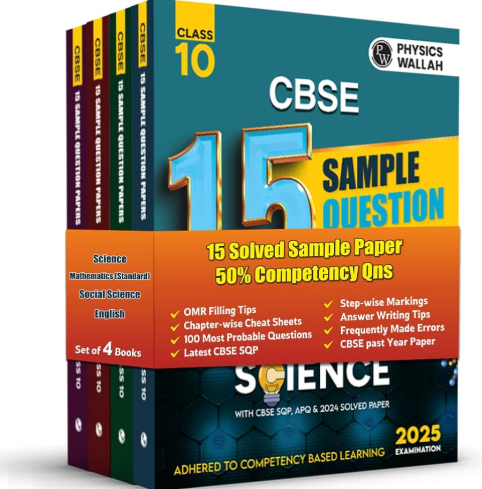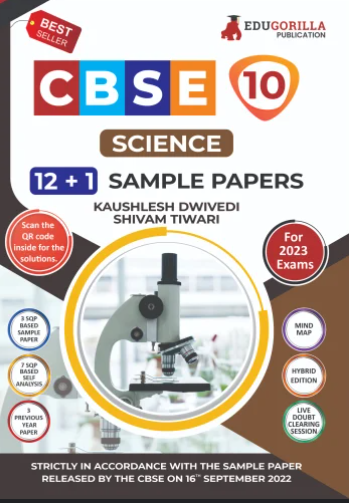
Table of Contents
Class X CBSE Previous Year Sample Question Paper: A Complete Guide for Students
The Class X CBSE Board Examination is a crucial milestone for students as it lays the foundation for their academic and career path. One of the most effective ways to prepare for the exams is by solving previous year sample question papers. These papers provide a clear understanding of the exam pattern, marking scheme, important topics, and time management skills.
This article provides a detailed guide on the importance of CBSE previous year sample papers, subject-wise analysis, and expert tips to maximize your score.
Why Should You Solve CBSE Previous Year Sample Question Papers?
1. Familiarity with Exam Pattern
- CBSE follows a structured question paper pattern, and solving previous year papers helps students understand the types of questions asked.
- It provides insights into weightage given to different topics.
2. Understanding the Marking Scheme
- CBSE sample papers come with marking schemes, which help students analyze how marks are distributed across different sections.
- It aids in structuring answers effectively to score maximum marks.
3. Improves Time Management Skills
- Practicing previous year question papers helps students allocate time properly for each section.
- It ensures that students complete the paper within the given duration.
4. Boosts Confidence and Reduces Exam Stress
- Solving question papers regularly reduces anxiety and makes students feel more prepared for the actual exam.
- It helps in self-assessment, allowing students to focus on their weak areas.
Subject-Wise Analysis of CBSE Class X Previous Year Sample Papers
1. Mathematics
- Key Topics: Algebra, Geometry, Trigonometry, Probability, Coordinate Geometry
- Question Type:
- Objective-type (MCQs)
- Short-answer type
- Long-answer type questions
- Preparation Tips:
- Practice previous years’ 4-5 papers to get an idea of important topics.
- Focus on formulas and stepwise solutions, as marks are given for steps.
- Solve questions with a time limit to enhance speed.
2. Science (Physics, Chemistry, Biology)
- Key Topics:
- Physics: Light, Electricity, Magnetic Effects of Current
- Chemistry: Chemical Reactions, Acids-Bases-Salts, Metals and Non-Metals
- Biology: Life Processes, Heredity and Evolution, Control and Coordination
- Question Type:
- Concept-based questions
- Diagram-based questions
- Numerical problems (Physics)
- Preparation Tips:
- Revise NCERT concepts thoroughly, as CBSE questions are based on the textbook.
- Draw neat and labeled diagrams wherever required.
- Solve at least 5 previous year papers to analyze recurring concepts.
3. English (Language & Literature)
- Key Sections:
- Reading Comprehension
- Writing Skills (Letter Writing, Analytical Paragraph)
- Grammar (Tenses, Voice, Modals)
- Literature (Prose & Poetry from NCERT)
- Question Type:
- MCQs based on passages
- Short-answer and long-answer questions
- Descriptive writing
- Preparation Tips:
- Work on speed reading to answer comprehension passages quickly.
- Follow a structured format for writing tasks.
- Revise NCERT chapters thoroughly for literature-based questions.

4. Social Science (History, Geography, Civics, Economics)
- Key Topics:
- History: Nationalism in India, Print Culture, Industrialization
- Geography: Resources, Agriculture, Water Resources
- Civics: Power Sharing, Democracy, Political Parties
- Economics: Development, Globalization, Consumer Rights
- Question Type:
- Objective-type
- Map-based questions
- Long-answer analytical questions
- Preparation Tips:
- Focus on dates, events, and important movements for History.
- Study maps and diagrams carefully for Geography.
- Solve previous 5-year question papers to identify repeated topics.
5. Hindi
- Key Sections:
- अपठित गद्यांश (Unseen Passage)
- व्याकरण (Grammar)
- लेखन (Essay, Letter, Notice Writing)
- साहित्य (Poems and Prose from NCERT)
- Preparation Tips:
- Practice reading comprehension to save time.
- Work on correct grammar usage.
- Solve previous year question papers to familiarize yourself with format.
Step-by-Step Strategy to Solve CBSE Previous Year Papers Effectively
Step 1: Start with the Latest Paper
- Begin with the most recent sample paper to understand the latest trends in question papers.
Step 2: Set a Timer and Create an Exam-Like Atmosphere
- Solve the paper within the actual exam time limit (3 hours).
- Avoid distractions and attempt the paper with full concentration.
Step 3: Evaluate Your Answers with Marking Scheme
- Compare your answers with official CBSE marking schemes.
- Identify your weak areas and work on them.
Step 4: Note Down Important Questions
- Some questions get repeated every year with slight modifications.
- Maintain a separate notebook to write down commonly asked questions.
Step 5: Revise and Reattempt Difficult Sections
- If you find any section difficult, revise the concepts and attempt those questions again.
- Focus on accuracy and speed improvement.
Where to Find CBSE Class X Previous Year Sample Papers?
Students can access official sample papers and previous year papers from:
- CBSE Official Website (cbse.gov.in)
- NCERT Websites and Educational Portals
- Reference Books like Arihant, Oswaal, and Educart
- School Libraries and Coaching Institutes
Conclusion
CBSE Class X previous year sample question papers are a powerful tool to boost preparation. They not only help students understand the exam pattern and marking scheme but also build confidence and improve time management skills. Regular practice of these papers ensures higher accuracy, better speed, and a stronger grasp of concepts.
So, if you are preparing for your CBSE Class X board exams, start solving previous year sample papers today to maximize your scores and ace the exams!
FAQs
1. How many years of CBSE question papers should I practice?
It is recommended to solve at least 5 years of previous question papers to understand important topics and question patterns.
2. Are CBSE sample papers similar to the actual board exam papers?
Yes, CBSE sample papers are designed based on the latest syllabus and exam format, making them a valuable resource for board exam preparation.
3. What is the best way to analyze my performance in sample papers?
Compare your answers with the CBSE marking scheme, identify mistakes, and focus on improving weak areas.
4. Can I score full marks by practicing previous year papers?
While solving previous papers helps in understanding patterns and improving accuracy, students must thoroughly study NCERT textbooks and practice additional exercises to secure full marks.
5. Where can I download CBSE previous year papers for free?
You can download official CBSE previous year question papers from the CBSE website cbse.gov.in or educational portals.
This guide will help you make the most of CBSE previous year sample papers, ensuring a well-planned and confident approach to your board exams!

